


MOLECULAR MONITORING OF CHIMERISM AFTER BONE MARROW TRANSPLANTATION IN BULGARIA
Velizarova M1, Zaharieva B2, Dimova I2, Nikolova D2, Atanasova S2,
Avramova B3, Mihailov G3, Jordanova M3, Bobev D3, Toncheva D2,*
*Corresponding Author: Professor Draga Toncheva, Department of Medical Genetics, Medical Faculty of Sofia, 2 Zdrave str., 1431 Sofia, Bulgaria; Tel./Fax: +359-2-9520357; E-mail: dragatoncheva@yahoo.com
page: 37
|
|
RESULTS
In patient #1, NCC was detected 10 days after the transplantation (95%). It was evaluated once monthly for 6 months. Starting from the third month, the chimerism became MC (50%) with further temporary decreasing amounts of autologous DNA (Fig. 2a). The patient suffered hard graft versus host disease (GVHD), and after cytomegalovirus (CMV) infection, died. In patient #2, the donor cells increased from 6 to 70% over 3 months (Fig. 2b). He achieved full remission.
Patient #3 showed CC (100%) during most of the analyses with only a slight decrease in the percentage of donor cells (still more than 90%) in the ninth month (Fig. 2c). The clinico-hematological findings indicated remission. Patient #4 went from NCC to MC within 4 months, with clinico-hematological results that indicated an early relapse (Fig. 2d). In patient #5, only 22% MC was achieved. It decreased dramatically to 0% accompanied by graft failure within a month (Fig. 2e).
Patient #6 showed autologous recovery (98 to 0% chimerism) over 12 months. Unstable MC started in the fifth month. Decreasing levels of donor chimerism occurred prior to graft rejection. The patient is now in remission after a complete autologous recovery (Fig. 2f).
The three male-to-male donor-recipient pairs were studied for chimerism by genotyping of STR and VNTR markers. Patient #7, where the marker SERT was informative, showed chimerism after 3 months, followed by a recurrence of the illness. Patient #8 died before the first monitoring, and patient #9 was not studied because none of the molecular markers showed any informative results.
Table 1. Clinical data.
| Patient code |
Age |
Sex |
Diagnosis |
Donor |
|
1 |
8 |
M |
ALL |
Sister, full identical |
|
2 |
13 |
M |
MDS – RAEB |
Sister, full identical |
|
3 |
12 |
M |
ALL |
Sister, full identical |
|
4 |
10 |
M |
ANLL |
Sister, full identical |
|
5 |
|
M |
Thalassemia major |
Mother, full identical |
|
6 |
37 |
F |
Aplastic anaemia |
Brother, full identical |
|
7 |
10 |
M |
ALL |
Brother, haplo identical |
|
8 |
10 |
M |
ALL |
Unrelated donor, full identical |
|
9 |
15 |
M |
AML |
Father, full identical |
Figure 1. Recipient (a) and donor (b) cells in recipient blood samples, evaluated by FISH.
 
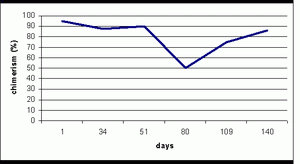
Figure 2. Chimerism in patient 1.
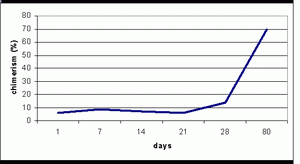
Figure 3. Chimerism in patient 2.
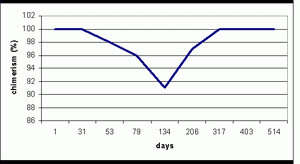
Figure 4. Chimerism in patient 3.
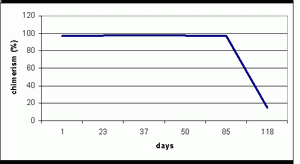
Figure 5. Chimerism in patient 4.
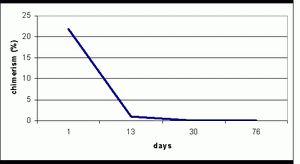
Figure 6. Chimerism in patient 5.
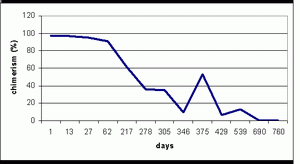
Figure 7. Chimerism in patient 6.
|
|
|
|



 |
Number 27
VOL. 27 (2), 2024 |
Number 27
VOL. 27 (1), 2024 |
Number 26
Number 26 VOL. 26(2), 2023 All in one |
Number 26
VOL. 26(2), 2023 |
Number 26
VOL. 26, 2023 Supplement |
Number 26
VOL. 26(1), 2023 |
Number 25
VOL. 25(2), 2022 |
Number 25
VOL. 25 (1), 2022 |
Number 24
VOL. 24(2), 2021 |
Number 24
VOL. 24(1), 2021 |
Number 23
VOL. 23(2), 2020 |
Number 22
VOL. 22(2), 2019 |
Number 22
VOL. 22(1), 2019 |
Number 22
VOL. 22, 2019 Supplement |
Number 21
VOL. 21(2), 2018 |
Number 21
VOL. 21 (1), 2018 |
Number 21
VOL. 21, 2018 Supplement |
Number 20
VOL. 20 (2), 2017 |
Number 20
VOL. 20 (1), 2017 |
Number 19
VOL. 19 (2), 2016 |
Number 19
VOL. 19 (1), 2016 |
Number 18
VOL. 18 (2), 2015 |
Number 18
VOL. 18 (1), 2015 |
Number 17
VOL. 17 (2), 2014 |
Number 17
VOL. 17 (1), 2014 |
Number 16
VOL. 16 (2), 2013 |
Number 16
VOL. 16 (1), 2013 |
Number 15
VOL. 15 (2), 2012 |
Number 15
VOL. 15, 2012 Supplement |
Number 15
Vol. 15 (1), 2012 |
Number 14
14 - Vol. 14 (2), 2011 |
Number 14
The 9th Balkan Congress of Medical Genetics |
Number 14
14 - Vol. 14 (1), 2011 |
Number 13
Vol. 13 (2), 2010 |
Number 13
Vol.13 (1), 2010 |
Number 12
Vol.12 (2), 2009 |
Number 12
Vol.12 (1), 2009 |
Number 11
Vol.11 (2),2008 |
Number 11
Vol.11 (1),2008 |
Number 10
Vol.10 (2), 2007 |
Number 10
10 (1),2007 |
Number 9
1&2, 2006 |
Number 9
3&4, 2006 |
Number 8
1&2, 2005 |
Number 8
3&4, 2004 |
Number 7
1&2, 2004 |
Number 6
3&4, 2003 |
Number 6
1&2, 2003 |
Number 5
3&4, 2002 |
Number 5
1&2, 2002 |
Number 4
Vol.3 (4), 2000 |
Number 4
Vol.2 (4), 1999 |
Number 4
Vol.1 (4), 1998 |
Number 4
3&4, 2001 |
Number 4
1&2, 2001 |
Number 3
Vol.3 (3), 2000 |
Number 3
Vol.2 (3), 1999 |
Number 3
Vol.1 (3), 1998 |
Number 2
Vol.3(2), 2000 |
Number 2
Vol.1 (2), 1998 |
Number 2
Vol.2 (2), 1999 |
Number 1
Vol.3 (1), 2000 |
Number 1
Vol.2 (1), 1999 |
Number 1
Vol.1 (1), 1998 |
|
|

